Xaudia has been running for about 15 years and we get a lot of repair work which now seems routine. We see hundreds of Reslos, B&O mics and Beyers in particular. When I started out, everything was new but it is now a rare occurrence to see a ribbon microphone that I have not worked on before. Sometimes I think I have seen it all and then something new comes along. These moments are exciting and a new challenge is always appreciated.
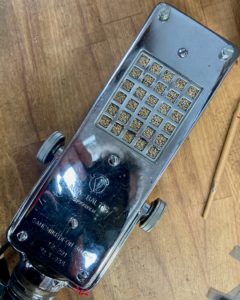 |
| AGA-Baltic T2 Ribbon Microphone |
This rare Swedish beauty came in for repair recently. Not only had I never worked one one before, I had never even heard of it! This was made by AGA-Baltic, who (according to Swedish Wikipedia) came into existence in 1928 after a merger between AB-Baltic and AGA companies. They made some rather elegant radio sets and, later, TV equipment. They clearly made microphones too.
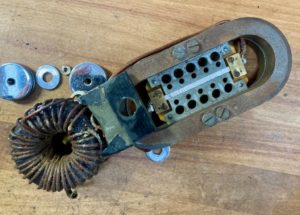 |
| Motor and transformer assembly from AGA microphone |
From the magnet and transformer technology, I would date this as an early 1930s microphone. The motor comprises two large steel pole pieces sandwiched between four large horseshoe magnets, and it uses a massive toroidal transformer to raise the output voltage and impedance to 30 ohms. The holes around the ribbon are most likely designed to increase the high frequency response of the microphone. The only comparably sized toroidal transformer that I have seen is in the Siemens / Telefunken M201, which dates back to around 1928. Transformer technology got smaller quickly!
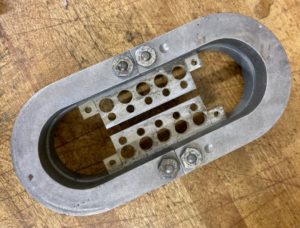 |
| AGA motor after corrosion removed |
The magnets in this microphone have held their field well and I measured about 2500 Gauss in the ribbon gap, which is fairly respectable for a microphone of this age. For reference, a good Melodium 42B would measure about 3000 Gauss. However, the whole motor assembly was corroded, so I stripped it down, treated with Rust-Off and then re-painted to prevent further corrosion. Everything else was cleaned and new grill cloth and mesh fitted. With old microphones that have been out of service for decades it is often best to do a complete rebuild.
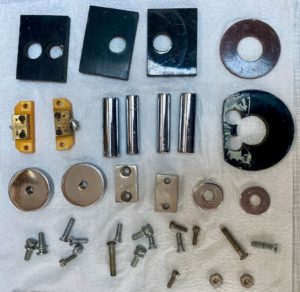 |
| AGA hardware parts being cleaned. |
With a new ribbon in place the sound was weak and disappointing. The old toroidal transformer has not aged well and the transmission of high frequencies in particular was attenuated giving a dark woolly tone with a lot of noise. It also seemed to be a good aerial for picking up hum too.
Impedance matching didn’t help so we were faced with the dilemma of keeping it all original or switching out the transformer and having a useful working microphone, but potentially losing some of the value to collectors.
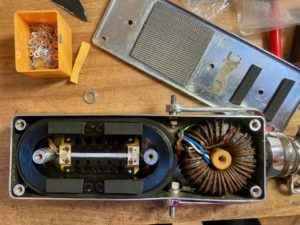 |
| AGA Baltic T2 – Half way back to working condition. |
This situation is always a difficult choice, but after consultation with the owner we decided that the microphone should be a working studio tool, and the most sympathetic repair would be to fit a new transformer from a Coles 4038. This replacement is also a toroidal transformer so we keep the ‘toroidal sound’, if there is one*. (*There probably isn’t.) The old transformer will of course be returned to the owner and can be re-installed in the future for collectors value.
And the results were good! The new transformers has a much better high end response, lower noise floor and does not pick up hum. The microphone is quite useable and still sounds very much like a vintage ribbon microphone. A well designed transformer should be there for impedance matching purposes and should not be contributing too much to the sound anyway.
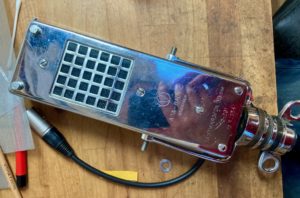 |
| Restored AGA-Baltic ribbon microphone |
I wonder what other rare and unusual microphones are out there waiting for me? Surprises and challenges are welcome!
Further Reading. There is not much information on the internet about these microphones but this does get mentioned briefly at the AGA museum.